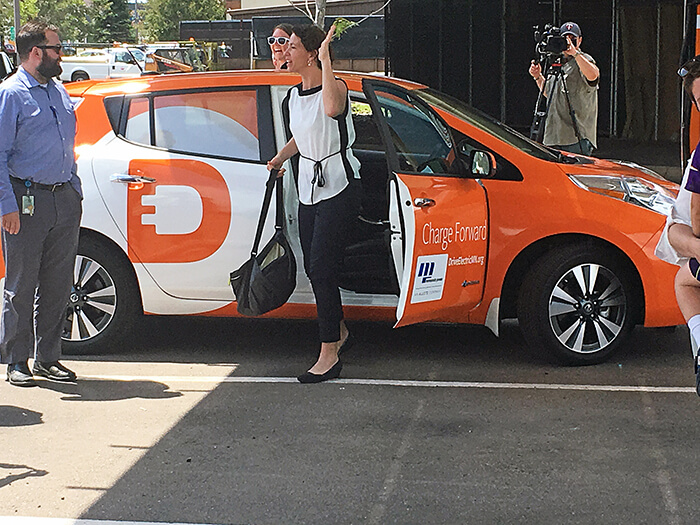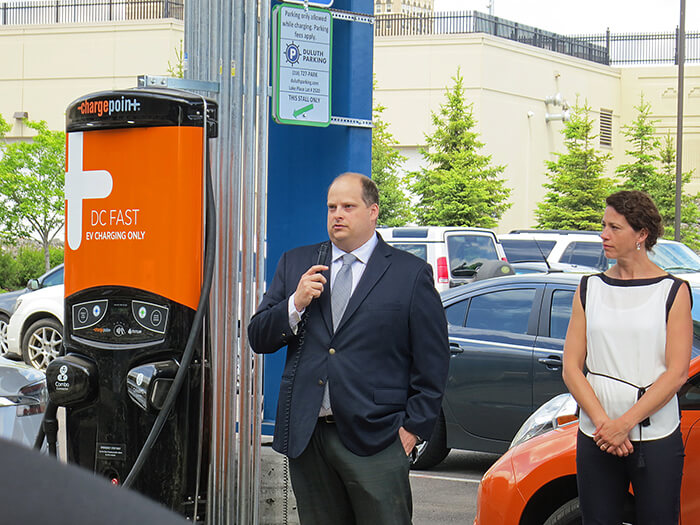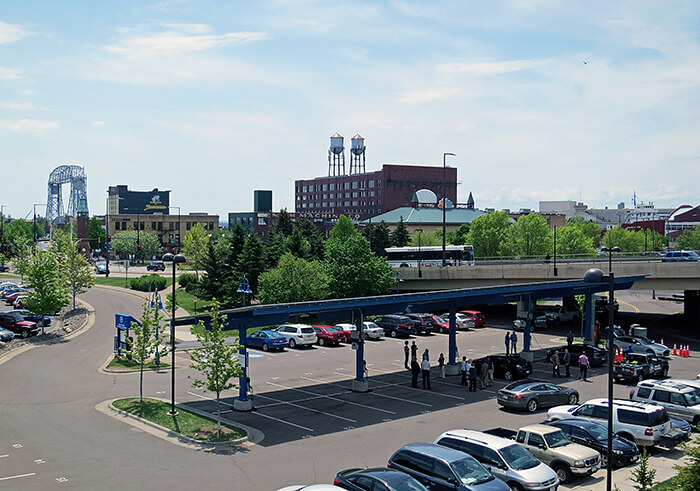Partners celebrate solar-powered charging station in Canal Park
June 8, 2017
Minnesota Power, the city of Duluth, Enbridge and Hunt Electric celebrated completion of the region’s first public, solar-powered electric vehicle charging station on Thursday.
About 40 people and media outlets attended the event in the parking lot near Endion Station on a warm, sunny day, and seven electric vehicles, six with private owners and one Nissan Leaf MP has on display through Drive Electric Minnesota, were there to demonstrate the charging station.
Kris Spenningsby, supervisor of retail accounts for Minnesota Power, said the project was borne out of the partners’ search for ways to reduce carbon emissions in our day-to-day lives.
“Little projects like this and big projects like Camp Ripley all go into making that goal achievable,” he said.
Duluth Mayor Emily Larson said the city has a goal to reduce its greenhouse gas emissions 80 percent by 2050, and the charging station is a sign of the partners’ commitment to clean energy.
“Partnering renewable energy with parking and convenience in the heart of our tourist district is just fantastic,” she said. “We achieve our energy goals when we work well in partnership with others.”
John Swanson, vice president of major projects for Enbridge, said his company has invested about $5 billion in renewable energy, including wind, solar, hydro, biomass and geothermal resources.
“We need to bring every technology available to the table,” he said. “This project is a great example.”
Brad Boos, president of Hunt Electric’s Duluth branch, said solar energy projects have become a big part of the company’s business, with more than 400 megawatts of projects under contract or pending this year.
“Hunt is now focusing on renewables,” he said.
The three private partners invested about $378,000 in the project in Canal Park and donated it to the city of Duluth, which contributed the use of the space and will operate and maintain the facility for its expected 25-year lifespan. The solar array became operational last week.
“I think this is a great example of how we can work together and achieve a project that works well for everybody,” Spenningsby said.
Some facts about the solar-powered charging carport and electric vehicles:
- The 54-kilowatt canopy is constructed of 171 solar modules, each module rated at 315 watts.
- The project has nine chargers. Four dual-port charging stations offer eight plug-ins that can charge a vehicle in two to six hours, depending on vehicle make and model. The ninth charger is a more powerful DC fast-charging station capable of charging a vehicle in 20 to 40 minutes.
- When fully charged, electric cars can travel from about 100 miles to about 200 miles, depending on vehicle make and model.
- The charging station’s solar panels will feed electricity into the energy grid when the EV chargers are not in use, making the charging carport a net zero energy user.
- Charging a vehicle will cost 80 cents an hour for the slower chargers and $1 an hour for the more powerful fast-charger. These costs are in addition to standard parking lot rates.
- Electric vehicles generally average a little more than 3 miles per kilowatt-hour. In terms of gasoline, that translates into about 100 miles per gallon.
- The carport also offers covered parking for additional vehicles.





